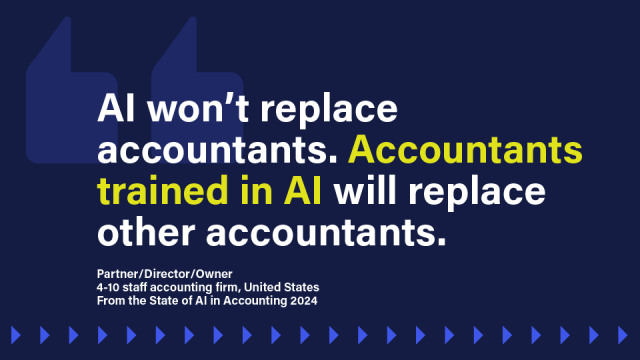We are at a fascinating milestone in the evolution of accounting technology and its impact on business. Many working professionals can still remember the infancy of accounting technology.
Paper ledgers gave way to spreadsheet applications. Accounting professionals passed files back and forth from shared drives or emailed them to peers and clients.
Then, those spreadsheets became more advanced. Accountants shared them in content management systems or stored them in the cloud so that multiple people could work simultaneously. Now, artificial intelligence (AI) and machine learning enable applications to draw conclusions and anticipate trends.
The rush of technology advances will certainly impact the accounting profession. Thinking about all of the different ways that technology could impact accounting is as dizzying as it is speculative. So, how can accountants prepare for a future where technology remains somewhat unknown?
“You can’t run an accounting firm today like you did in 1980, but it amazes me how many people try,” says Bill Carlino, managing director at Whitman Transition Advisors LLC. “Historically, the accounting industry has not been the fastest to adopt change, but there have been seminal technology events that have really advanced the pace of change—and the industry is now changing faster.”
Broad technology trends like cloud computing, cyberthreats, and AI are impacting all businesses. But which accounting trends are having the most impact, and how?
Accounting technology and trends making an impact in 2025
Trend 1: Remote accounting work
Whether hybrid, fully remote or because of client travel, some level of remote work has become the new normal for accounting firms. Flexibility and the ability to work from anywhere are critical for employees and firm leaders.

As a result, cloud document management systems have taken on a more critical role. With digital document management, firms can create workflows that establish repeatable processes and give leaders and employees a real-time view into the status of projects and client engagements.
In the cloud, firms can merge sales data, client interaction information, financial reports and contract information to form a complete and continually updated online profile for each client account. Data analysis applications enable firms to develop strategies and improve client service based on real-time information with help from cloud services that provide assistance with decision-making.
It’s essential that firms store data and run applications in the cloud to ensure they and their clients have secure access to updated data from anywhere and at any time.
Trend 2: Artificial intelligence (AI) accounting
Just a few years ago, hardly anyone in accounting or any other profession could have imagined the cultural and business applications that AI has today. But AI has worked its way into our everyday lives quickly, and it’s making an impact on accounting technology, too.
But if the past year has taught us anything, it’s that AI is here to stay.
When considering an AI-based solution at your accounting firm—you must:
- Fully vet the solution before implementing it. Will it help you do your job quickly, efficiently and accurately? Define use cases and guidelines clearly for yourself and for staff.
- Use purpose-built accounting AI tools. Since they’re made for accounting, these tools will be easier to adopt, and their support will know your specific workflows.
- Check its security protocols. Does it encrypt the data going into it? Is access controlled? Eliminate any uncertainty before you start throwing client information into the ether.

Trend 3: Blockchain
While AI has arrived in the accounting profession, another innovation is mostly still on the horizon: blockchain technology.
Mostly associated with cryptocurrency trading for better or worse, blockchain, a sort of decentralized, distributed database, could make a significant impact on accounting technology.
For instance, a record on the blockchain that is self-auditing and immutable could lead to a reduction in the time and effort necessary to verify company financials. It could also drastically reduce the difficulty and complexity of audits.
Trend 4: Client advisory work
With many traditional accounting and compliance tasks being automated through AI and advanced technology, accounting professionals—you—have a huge opportunity to provide more value-added advisory services to your clients.
Data may be automated, but your deep understanding and insights of that financial data aren’t. By leveraging your expertise and business acumen to help clients make smart decisions, you’re setting your clients up for a profitable future (and your firm, too.)
“Softer skills such as client nurturing and providing strategic advisory services will position a firm positively for the future. Utilize technology for better solutions to get the commodity stuff done. Only then can accounting professionals win back meaningful time to play the role of trusted adviser.” Salim Omar, president and CEO of Straight Talk CPAs
As technology continues to reshape accounting, client advisory services represent a powerful way for firms to enhance their relevance and value in the eyes of clients. By embracing CAS, supported by smart technology investments, firms can thrive well into the future.
The future of accounting is you
Despite all the buzz around artificial intelligence, blockchain, and other disruptive technologies, it’s critical to remember that people remain at the heart of the accounting profession’s future.
Technology can automate tasks and analyze data at lightning speed, but it can’t replace the judgment, creativity, and personal touch that skilled accounting professionals bring to the table.
The most successful firms will be those that empower their people with the right tools and training to thrive. Accounting professionals who can combine deep technical expertise with strong interpersonal skills will be the superstars, using technology to enhance what they do, not replace it.
Subscribe to our blog to learn more about positioning your firm and team for enduring success in accounting’s high-tech, high-touch future.
